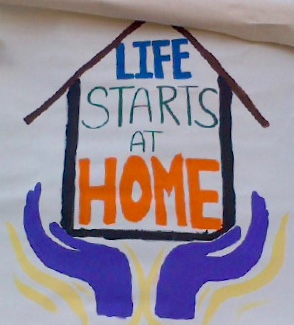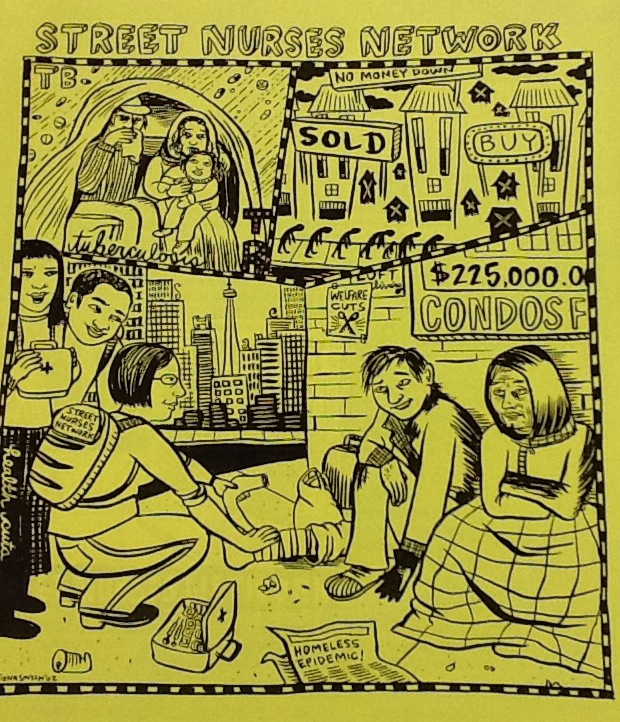The following is the text from Cathy Crowe’s graduand address to the University of Windsor nursing and kinetics class of 2015. Cathy received an honourary degree to recognize her extraordinary career.
You might be surprised to learn that my nursing activism began during the Cold War years, 30 years ago when I was a nursing student at Ryerson. A very open-minded pathophysiology teacher allowed me to do my patho paper on the medical effects of nuclear war. It’s why I use the term “hotspots” to describe what I see as a street nurse. Not radioactive hotspots but social welfare hotspots.
Initially, the hotspots I saw were what you would expect a street nurse to see: poor physical and mental health, multiple chronic health conditions, infections and weakened immune systems. Street nurses treated these conditions but also worked on the hotspots that worsened these problems: the terrible conditions in homeless shelters and the circumstances that forced so many to live and sleep outside. In many ways, the work mirrored work in a refugee camp, except it was here in Canada.
Meanwhile, while I was doing this work in the 1990s, the federal government cancelled our national housing program and I have to admit I wasn’t even aware they had done so. The results were catastrophic. We saw new hotspots: the resurgence of old diseases like tuberculosis, the return of old problems such as bedbugs, hunger and ultimately an epidemic of homeless deaths. We organized, we protested, we rallied and we declared homelessness a national disaster!
We called for a national housing program. We’re still calling for it.
While we wait and wait and wait for the federal government to act, the list of hotspots expands. Consider a few:
Climate change. Homeless people now face harm or death from inclimate weather — be it heat, cold, floods or ice storms.
Family and child homelessness is growing. This year an estimated 22,000 children will be trapped in shelters with their family — doing homework, going to school, saying to their friend “no sorry you can’t come over for a play date.”
Hate and discrimination. Homeless people are the targets of violent hate crimes, but also laws that criminalize them by making it illegal to sleep or beg in certain places.
The import of American-style approaches to homelessness that includes defunding and closure of shelters and food programs, leaving the charities or faith groups to fill the gap.
The de-housing of Aboriginal children and practices of cultural genocide that are still destroying lives today.
I’ve always seen the term street nurse as a political term. It says — “Look here in Canada we have so much homelessness that an entire nursing specialty called street nursing has begun.”
Some people ask me: “Are you still a street nurse?” I tell them: “Yes, I am and I’m working on the cure.”
The cure is pure and simple. It’s about a Canadian value that Second World War vets fought for when they returned to Canada from the front. They valued the right to housing. These heroes protested, they rallied; they even occupied empty buildings in their fight. They won a national housing program that helped build the country we know. Our national program created 20,000 units a year — homes, apartments, housing co-ops, social housing, shared housing — until it was killed.
In a natural disaster such as an earthquake it is crucial to put political and social divisions aside and focus on providing solutions to the injured and the homeless and that includes rebuilding and rehousing people.
So it is with a social welfare disaster like homelessness in Canada.
This year, for the first time in many years we all have the chance to put housing on the country’s agenda because we have a federal election, although the new Canada Election Act attempts to disenfranchise both students and homeless people.
So my appeal to all of you today is to help me make the cure happen. Vote for housing this October.

Let me close with the words of one of the kids from a film I made. It’s called Home Safe. It features a Windsor family, made homeless by the collapse of the auto industry.
“When you have a home, it’s exactly like a protection, sort of like a force field from stuff that are dangerous. So, sometimes, when you are homeless….if you know that you’re getting a decent home and you’re going there soon you kind of get overwhelmed with happiness and that’s what a lot of people want now.”
(The above is an excerpt from my Honourary Doctor of Law speech at the University of Windsor June 19, 2015 to the graduating class of nursing and kinetics.)
Photo – Cathy Crowe, image of T-shirt designed for Street Nurses Network
Photo – Cathy Crowe



